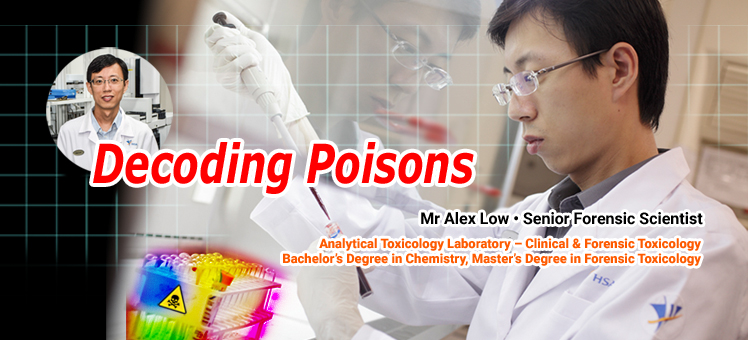Decoding poisons

Analytical toxicology
Growing up, Alex aspired to be a police officer to fight crime and help others. While he did some policing as a volunteer special constabulary officer during his university days, he eventually took a different path and joined HSA as a forensic scientist in 2007.
As it turns out, he still plays an important role in law enforcement and in helping others at his current job, just not at the frontline.
1. Tell us more about your job at the Analytical Toxicology Laboratory.
One of the differences between the Analytical Toxicology Lab and the other forensic labs is that we have the unique role of supporting not just the law enforcement agencies, but also healthcare institutions such as hospitals and clinics.
We analyse biological specimens and exhibits for common poisons, pharmaceutical drugs as well as drugs of abuse. For example, we analyse the deceased’s biological specimens sent from our HSA Forensic Medicine Division to determine if there are any drugs or poisons that could have contributed to the death.
We also provide toxicological analysis for biological specimens from hospitals to help ascertain possible poisonings. In some emergencies where the toxicology result is critical for the treatment and/or diagnosis, such as brain death certification, we provide 24/7 on-call service to ensure the timely analysis and release of results for such requests.
Besides biological specimens, we also analyse exhibits from death/crime scenes to determine if the exhibit (e.g. a bottle of unknown liquid) could have attributed to the death/crime.
2. You obtained your Master’s in Forensic Toxicology under HSA’s sponsorship. Can you tell us more?
My supervisor recommended a few courses that I could take to further my studies and enhance my knowledge in the field of toxicology. Eventually, I chose to take up a Master’s degree in Forensic Toxicology from the University of Florida that was most relevant to my job as well as my interest.
The course was a distance-learning programme that offered flexibility in the pace of study. My supervisor and my colleagues were also very supportive during my 3 years of study. I was grateful that HSA provided a scholarship to cover the cost of the program including the final examination at the Florida campus in USA.
3. What are the kind of samples that come to your lab? Have you handled any unusual ones?
The laboratory typically handles body fluids such as blood, urine, stomach contents, bile, vitreous humour, liver and kidney tissue samples, and these could be from human or animal origin. Scene exhibits typically include tablets/capsules, liquids, drug paraphernalia such as bongs, syringes, straws and sometimes food items.
There are occasional unusual samples such as maggots found in decomposing bodies, vomitus, and undissolved masses of tablets from the stomach contents. There was once we had to test breast milk as it was suspected that a domestic helper had added an ‘extra substance’ to it. Upon analysis, we found that the breast milk was adulterated with essential oil.
 Alex loads some samples into the instrument.
Alex loads some samples into the instrument.
A forensic scientist should be meticulous and detail-oriented, as we cannot afford to make mistakes. He/she should also have a curious mind, to question and look beyond the surface when encountering non-routine findings.
,
4. Sometimes, you are on standby for urgent cases. Which was one of the memorable instances where you were called back to work?
A female patient was admitted to a hospital with a history of overdose of pesticide. Her symptoms were initially mild and hence she was treated symptomatically. Her conditions however deteriorated 24 hours later after admission. The doctors were puzzled and hence ordered an emergency toxicology test. I was called back on a Sunday morning, together with a laboratory officer. We performed the tests and detected a new compound, which upon searching against commercial libraries, turned out to be fenthion. This was the first time we detected fenthion, an organophosphate pesticide, in Singapore, and the patient admitted that she had brought the pesticide from her native country. Fenthion is known to cause delayed presentation, which explained for the patient’s conditions. With the identification of the toxicant, the doctors were able to better manage the treatment of the patient.
5. What motivates you daily?
The satisfaction of helping people and knowing that our results can help the doctors in better understanding of the cause of the symptoms of the patients and hence provide timely treatment, as well as knowing that the toxicological information we have provided to the forensic pathologists will help them in determining the cause of deaths and possibly bring closure for the next-of-kin.
6. What do you think are some of the qualities a forensic scientist should possess?
A forensic scientist should be meticulous and detail-oriented, as we cannot afford to make mistakes. He/she should also have a curious and inquisitive mind, to question and to look beyond when encounter with non-routine findings.
Related Articles